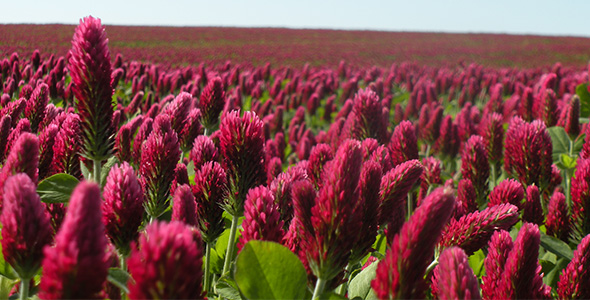ROKALI – the clover that helps farmers fight climate change
ROKALI is a crimson clover bred to cope with the challenges of climate change. The plant improves soil fertility, which cuts nitrogen costs and provides highly digestible early spring fodder at a time when it’s needed most.
05/12/2022
ROKALI, our newest annual clover variety, has already made a name for itself as the crimson king of the clovers. It comes at a time when sky-high energy prices are influencing the supply and costs of artificial nitrogen, and climate change puts pressure on farmland production.
A brilliant tool for intercropping
One solution to the problems of reduced fertility and fodder production is intercropping, which is where ROKALI reveals its power.
- Fast emergence: restricts the development of weeds and reduces erosion of soil, water and nutrients.
- Early spring variety: quickly outstrips other varieties at the beginning of flowering by up to two weeks.
- Highly digestible: has a high yield of dry matter and a high protein content (over 25% crude protein), and provides up to 80% digestibility in early spring.
- Nitrogen fixer: symbiotic Rhizobium bacteria in ROKALI’s roots can fix from 80 kg to 160 kg N/ha into the soil, leading to a substantial reduction in fertiliser costs.
To learn more about how ROKALI improves the sustainability and the profitability of farming, speak to your local DLF representative.

ROKALI – your weed suppressor and fertility partner
With its fast establishment, ROKALI is an ideal green-manure, winter cover crop. Fast establishment covers the area in clover leaves that suppress weed growth and later, when incorporated into the soil, increase the soil organic matter. The additional organic matter helps to prevent nutrient loss and increase soil fertility; it makes the soil better for future crop production. ROKALI’s ability to suppress weeds reduces a farmer’s need for herbicides and helps them farm more sustainably.
ROKALI – your nitrogen partner
ROKALI’s sustainability credentials are enhanced by its ability to fix nitrogen and reduce the need to add artificial fertiliser to any following crop. At a single stroke, ROKALI improves the environment and farm finances by insulating farmers against the rising costs of artificial fertiliser and fuel for their machinery.
ROKALI for early spring fodder
ROKALI matures earlier than other varieties, which allows for an early first cut in the spring. With its high protein content and digestibility, ROKALI is an excellent early-spring source of high-quality fodder and homegrown protein. Since that first spring cut can come from a field originally sown as a cover crop, ROKALI readily doubles as a winter crop.
ROKALI is a superb component of intercrop mixtures
To feed a growing human population, the world needs a good and secure food supply. Two staples of this worldwide supply are maize and wheat. They are popular because they produce high yields, provide a good economic return, and find uses in various branches of the global food chain. The downside is that wheat and maize remove a significant amount of nutrient from the soil, and their root systems do not improve soil structure. If anything, they harm soil structure.
To correct the damage, farmers increasingly plant intercrop mixtures. A good intercrop will improve soil structure, add organic matter and limit erosion and weed growth between the main crops.
Our recommendation for an outstanding intercrop mixture would contain:
- 20% winter vetch
- 30% ROKALI crimson clover
- 50% Italian ryegrass of the DASAS or TURGO varieties
This mixture is an ideal intercrop to grow during the autumn. The following year it produces an early spring cut with high yields and good-quality fodder. In addition, the Fabaceae family (crimson clover and winter vetch) gives the soil a valuable shot of nitrogen to support any following crop.
Farmers who focus on the quality of their precrops and intercrops will improve their soil structure and replenish its vital organic matter. They will be supporting consistently high yields and quality soils for future generations.
ROKALI also performs well in a mixture with nothing but Italian ryegrass. An ideal proportion would be 30% ROKALI and 70% Italian ryegrass. In this mix, ROKALI improves the protein content while Italian ryegrass produces a high forage quality. The two components work together to boost farm profitability.
To find out more about ROKALI speak to your DLF representative.
